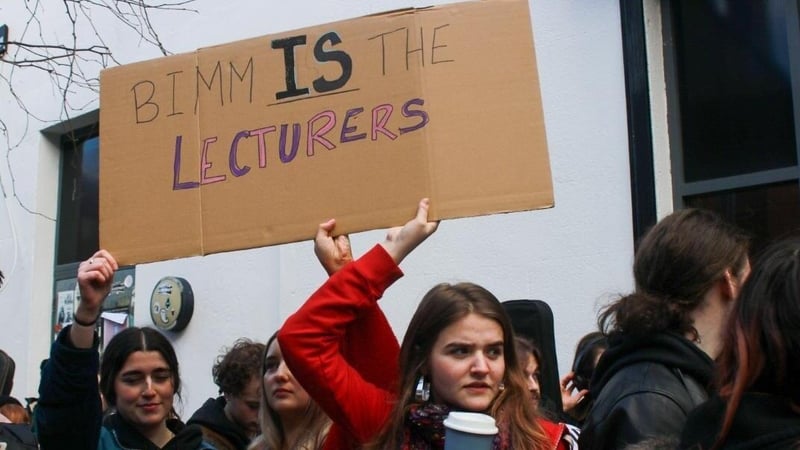BIMM on Dublin’s Francis Street enjoys a strong reputation for excellence among young people interested in pursuing a career in the music industry.
BIMM stands for the British and Irish Modern Music Institute, and this private company has seven colleges across the UK, Germany and Ireland.
The fact that it is a private college may come as news to many of its students in Dublin though.
Most of them pay their fees to Technological University Dublin.
“It is confusing. BIMM is owned by a private company in England, yet our degree is publicly funded.”
They are enrolled on a course that is listed by the CAO as a TU Dublin course, and unlike students in other private colleges they are eligible for State-funded SUSI grants.
More than 500 out of BIMM’s 640 students are enrolled on the Commercial Modern Music BA course, which has been outsourced by TU Dublin to BIMM.
TU Dublin signed a contract with BIMM for delivery of the course in 2010.
The following year BIMM opened its doors in Dublin and the first cohort of students began their studies.
Commercial Modern Music is the only degree course offered by BIMM. The course accepts 200 students every year.
TU Dublin told RTÉ News that it “actively oversee[s] the quality assurance of the degree while ensuring that Commercial Modern Music students receive comprehensive academic and well-being support at TU Dublin”.
Read more: Dublin music college staff to strike over proposed redundancy plans
‘Confusing’
It described BIMM as “a private and separate entity to TU Dublin”.
It is a situation that confuses students at the college.
Third year student at BIMM Niall Dowling said students at the college identify as BIMM students.
“The only relationship we feel with TU Dublin is at the end of four years when we get our degree from them,” he said.
“But it is confusing. BIMM is owned by a private company in England, yet our degree is publicly funded, and [unlike students attending other private colleges] we are eligible for SUSI grants.”
One of the arguments staff at BIMM are putting forward is that they deserve pay and other terms and conditions on a par with those enjoyed by teachers at other third level colleges.
Of the current dispute at BIMM between staff and the company, TU Dublin said it “understands that BIMM Music Institute Dublin, a private and separate entity to TU Dublin, is consulting on a proposed new staffing model”.
Financial arrangement
A 2017 letter from DIT (now TU Dublin) to the Public Accounts Committee gives details of the arrangement.
It said: “While DIT has excellent provision in classical, traditional and jazz music education in the Conservatory of Music and Drama, to develop this additional provision would have required that DIT build or acquire additional facilities, add to existing staffing and develop the other necessary attributes required to deliver the programme.
“The most cost-effective solution was to partner with a recognised third party to deliver the best possible offering to students.”
Outlining the financial arrangement it said: “DIT receives all income relating to students on the programme including: Tuition fees, Student Contribution charge, [and] HEA Recurrent Grant Allocation.
“BIMM resources the delivery of the programme to students including providing: qualified teaching and support staffing, professional equipment [and] suitable premises.”
Commenting on the arrangement in light of the current dispute, IFUT trade union General Secretary Robert McNamara said: “BIMM has benefited from its formal ties to TU Dublin and the public funding system, while now aggressively moving towards mass redundancies, casualisation, and cost-cutting at the expense of its teaching staff.”
He added: “Despite this, BIMM has refused to engage with the established state machinery for dispute resolution by declining to attend the Workplace Relations Commission.”
Mr McNamara questioned what responsibility TU Dublin had “in ensuring that institutions it partners with uphold fair employment standards”.




